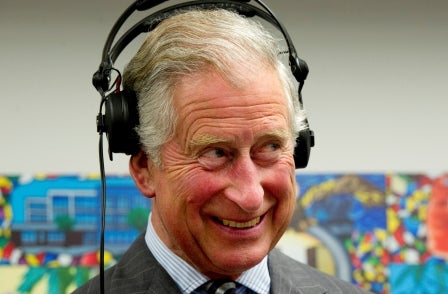
Guardian News and Media is to go to the High Court in an attempt to challenge a veto that Attorney General Dominic Grieve QC imposed to block the release of letters the Prince of Wales wrote to government ministers.
Grieve announced on Tuesday that he was imposing the veto on the release of correspondence between Charles and seven Government departments, as it was was part of the Prince's "preparation for kingship".
Making the letters public could potentially damage the principle of the heir to the throne being politically neutral, and so undermine his ability to fulfil his duties when king, Grieve said.
His veto came after the Government was ordered to disclose letters which Charles sent during a seven-month period in 2004 and 2005, after a journalist won a freedom of information appeal.
Three judges at a freedom of information tribunal ruled in favour of Rob Evans, of the Guardian, who had challenged the Information Commissioner's decision to uphold the refusal by the Government departments to release the correspondence.
The judges ruled that Evans was entitled to "advocacy correspondence" written by Charles – described as letters he had written seeking to advance the work of charities or to promote views.
But Grieve issued a certificate under the Freedom of Information Act vetoing the disclosure of the correspondence.
A Guardian News and Media spokeswoman said they intended to take the case further and challenge the veto in the High Court.
She said: "Last month's Freedom of Information tribunal ruling was a great victory for public interest, so we are dismayed at the heavy-handed ruling by the Attorney General.
"It is extraordinary that the Attorney General should use these powers to undermine the principles of openness and accountability, as the public has a right to know whether Government is being unduly influenced by Prince Charles's lobbying.
"We will be fully pursuing this with the intention of taking the Government to the high court to challenge the veto on the grounds that it has acted unlawfully."
Grieve said in a written statement yesterday: "I consider that such correspondence enables the Prince of Wales better to understand the business of government; strengthens his relations with ministers; and enables him to make points which he would have a right – and indeed a duty – to make as monarch."
He added: "If such correspondence is to take place at all, it must be under conditions of confidentiality. Without such confidentiality, both the Prince of Wales and ministers will feel seriously inhibited from exchanging views candidly and frankly, and this would damage the Prince of Wales' preparation for kingship."
The seven Government departments the Prince wrote to are Business, Innovation and Skills; Health; Children, Schools and Families; Environment, Food and Rural Affairs; Culture, Media and Sport; the Northern Ireland Office and the Cabinet Office.

Graham Smith, chief executive of the organisation Republic, which campaigns for an elected head of state, criticised the Attorney General's decision.
He said: "It's an open secret that Prince Charles lobbies the Government. What the public has a right to know is what he is lobbying for and whether he is actually influencing policy.
"The Attorney General's decision is all about protecting Charles and the royal family from scrutiny, putting his demands above the rights of the British people."
Maurice Frankel, director of the Campaign for Freedom of Information, also criticised the veto.
"This is the first time the government has vetoed a decision of the Upper Tribunal under the FoI Act. The previous vetoes have applied either to the Information Commissioner or the First Tier Tribunal.
"The Upper Tribunal heard from constitutional experts on both sides of the argument. It set out detailed, cogent, clearly argued reasons for its decision over a 65 page ruling. If the Upper Tribunal is wrong, the government would be able to challenge and overturn its decision in the Court of Appeal. It is choosing not to go down this route but to veto the decision instead, which suggests it is not confident of its ability to win the argument in law.
"The Upper Tribunal concluded that the Prince's lobbying on behalf of various charitable causes did not fall under the constitutional convention designed to educate the heir to the throne to become monarch. He is trying to change government policy, not learn about it.
"The convention is subject to a strict rule of confidentiality: neither side reveals what has taken place. The Upper Tribunal found that Prince Charles had disclosed information about his lobbying activities for use in Jonathan Dimbleby's biography of him. It points out that if Prince Charles himself considered these exchanges to be subject to the convention, he would not have disclosed them.
"The decision to exercise the veto is judicially reviewable. If the Guardian newspaper goes for judicial review, the government will still have to justify its decision in court."
The Campaign pointed out that just before the 2010 election the government amended the FoI Act to change the way the exemption for information relating to communications with the Royal Family operated.
Until that point, the exemption was subject to the Act's public interest test. But the amendment removed the public interest test from information relating to communications with the monarch and the next two in line to the throne.
This "absolute" exemption now prevented any access to such information for 20 years or until five years after the death of the individual concerned, whichever was later.
The Campaign said this meant that even if the government's veto was overturned at judicial review, no future request for similar information would succeed until the correspondence was at least 20 years old.
A Clarence House spokeswoman declined to comment.
Email pged@pressgazette.co.uk to point out mistakes, provide story tips or send in a letter for publication on our "Letters Page" blog






